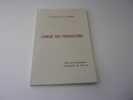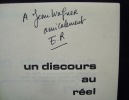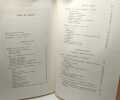-
Type
Autograph (1)
Book (53080)
Magazine (286)
Manuscript (2)
Maps (1)
New book (1)
Old papers (1)
Photographs (1)
-
Latest
Last 24h (78)
Last 3 days (49)
Last month (505)
Last week (92)
-
Language
Dutch (2)
English (29)
Finnish (1)
French (53268)
German (16)
Greek (5)
Italian (17)
Japanese (2)
Latin (20)
Polish (1)
Portuguese (2)
Russian (1)
Spanish (7)
Swedish (2)
-
Century
16th (66)
17th (198)
18th (1277)
19th (3672)
20th (22495)
21st (3813)
-
Countries
Belgium (6744)
Brazil (28)
Canada (6)
China (2)
Côte d'Ivoire (63)
Denmark (1012)
France (40630)
Germany (4)
Greece (3)
Italy (54)
Netherlands (281)
Switzerland (4545)
United States of America (1)
-
Syndicate
ALAC (6)
CLAM (5)
CNE (6)
ILAB (22160)
NVVA (1045)
SLACES (953)
SLAM (19841)
SNCAO (41)
Tanker om Kiærlighed Til Fædrelandet.
Kiøbenhavn, Nicolaus Møller, 1759. Lille 8vo. Samtidigt hldrbd. Rygforgyldning. Forgyldt skindtitel på ryg. Ryg med lette brugsspor. (20),312,(2) pp. Indvendig ren, trykt på skrivepapir.
Den sjældne originaludgave. ""Det er dog ikke blot R's stil, som frembyder den underlige dobbelthed"" det samme gjælder om hele hans Standpunkt: paa samme Tid, han lovpriser Enevoldsmagten of det bestaaendes Herlighed, er han gjennemtrængt af det 18. Aarhundredes Frihedsideer. Montesquieu og Rousseau ere hans Læremestre. Det kjendes lige fra hans Ungdomsarbeide ""Tanker om Kiærlighed Til Fædrelandet"" (1759), der vakte betydelig Opmærksomhed og gav Rahbek Anledning til at nævne ham som ""vor Borgerfriheds første Apostel"", og til hans senere Skrifter.""(Bricka, DBL).
LA VERITE ET LA LIBERTE - DEUX ETUDES
ORTHEZ. 1903. In-12. Broché. Bon état, Couv. convenable, Dos satisfaisant, Intérieur frais. 23 pages. . . . Classification Dewey : 100-PHILOSOPHIE ET DISCIPLINES CONNEXES
Classification Dewey : 100-PHILOSOPHIE ET DISCIPLINES CONNEXES
Der Schweizer Hermann Kurz. Diss.
Gutenberg, Lachen, A. Kessler 1953, 225x155mm, 171Seiten, broschiert. Guten Zustand.
Pour un paiement via PayPal, veuillez nous en faire la demande et nous vous enverrons une facture PayPal
Moise b. Sabbatai, lecteur juif du 'Livre des causes' et adversaire de la kabbale, en Italie, vers 1340.
, Brepols Publishers, 2018 Hardback, 332 pagina's, 156 x 234 mm, French, Hebrew. ISBN 9782503576145.
Un auteur inconnu et inedit, rare temoin de la rencontre de l?aristotelisme et du neoplatonisme, des sources juives et chretiennes, dans la philosophie juive en Italie (1e moitie du XIVe s.). This previously unknown Hebrew writer is a unique witness of the blend of Aristotelianism and Neoplatonism as well as of Jewish and Christian sources in Jewish philosophy in Italy (first half of the 14th century). Moise b. Sabbatai (flor. 1340) reflete un moment du judaisme italien expose a la philosophie de Maimonide, a sa lecture ?« mystique-intellectuelle ?» promue par Juda de Rome, a l?heritage thomiste, a la reflexion dantesque sur la langue et les langues, a la decouverte de la kabbale. Il est aussi un penseur coherent et original dans sa demarche. Le Livre des causes, opuscule neoplatonicien traduit trois fois en hebreu dans les decennies precedentes, lui fournit le support d?une meditation intense de l?omnipresence de la causalite divine dans le monde cree ; que cette cause soit d?une unite parfaite et au plus pres de sa creation l?oppose aux kabbalistes dont il partage la sensibilite neoplatonicienne mais qu?il veut enfermer dans un dilemme : si les sefirot sont en Dieu, elles detruisent son unite ; si exterieures a lui, il cree par leur intermediaire, ce qui est egalement inacceptable. Il a laisse une homelie sur l?unite hors du temps de la creation ; un traite contre les erreurs des rationalistes, kabbalistes et astrologues ; des notes critiques contre Thomas d?Aquin et son propre maitre sans doute, Juda de Rome ; un poeme metaphysique. Ces textes sont edites pour la premiere fois, introduits, traduits et annotes.
Nicolo Cusano
Milano, Fratelli Bocca 1942 ix + 330pp., 21cm., br.orig., non coupé, qqs.rousseurs aux tranches, bon état, dans la série "Storia universale della filosofia" vol.32, F77158
Experimentelle Untersuchungen über die Bedingungen der relativen Tiefenlokalisation unterschiedlicher Sehdinge
Bochum-Langendreer, Heinrich Pöppinghaus 1936 71pp., cm., text in German, Doctortal Dissertation (Inaugural-Dissertation zur Erlangung der Doktorwürde der Philosophischen und Naturwissenschaftlichen Fakultät der Westfälischen Wilhelms-Universität zu Münster), stamp at verso of title page, F110241
Kritik und Praxis. Zur Geschichte des Kritikbegriffs von Kant bis Marx
Berlin, de Gruyter 1975 ix + 302pp., 24cm., in the series "Quellen und Studien zur Philosophie" vol.8, cloth, 2 stamps (on title page), else very good, F74933
CONSCIENCE RELIGIEUSE ET MENTALITE TECHNIQUE
Desclée. 1962. In-8. Broché. Bon état, Couv. convenable, Dos satisfaisant, Intérieur frais. 143 pages. Jaquette très légèrement passée.. Avec Jaquette. . . Classification Dewey : 210-Philosophie et théorie
Troubles provoqués dans la conscience religieuse par l'avènement de la mentalité technique. Assimilation religieuse de la technique... Classification Dewey : 210-Philosophie et théorie
Eléments de psychopathologie médico-sociale, t.1 : l'adulte et t.2 : l'enfant
Paris, ESF, 1970. 2 vols In-8 (240x160mm) brochés, 194 - 132 p. Bon état général.
QUEL AVENIR POUR LA MEMOIRE / COLLECTION PHILOSOPHIE N°349.
GALLIMARD. 1997. In-8. Broché. Bon état, Couv. convenable, Dos satisfaisant, Intérieur frais. 128 pages - nombreuses illustrations en couleurs et en noir et blanc dans et hors texte.. . . . Classification Dewey : 100-PHILOSOPHIE ET DISCIPLINES CONNEXES
COLLECTION PHILOSOPHIE N°349. Classification Dewey : 100-PHILOSOPHIE ET DISCIPLINES CONNEXES
LOGIQUE DES PROPOSITIONS
Format moyen, couverture souple.137 pages. Bon état. Une expédition par Mondial Relay vous sera proposée 1979 universite Lille 3
Chemin d'Ombre.
LETHIELLEUX P. 6ème édition. 1905. In-24. Broché. Etat passable, Couv. légèrement passée, Dos abîmé, Intérieur frais. 244 pages. Frontispice en noir et blanc. Bandeaux et culs-de-lampe. Quelques pages non coupées. Manques sur le dos fendu et cassé.. . . . Classification Dewey : 210-Philosophie et théorie
Aux Jeunes Filles. Causeries. Classification Dewey : 210-Philosophie et théorie
DIEU SEUL LE SAIT. ENQUETE SUR LES MIRACLES.
HACHETTE CARRERE.. 1990. In-8. Broché. Bon état, Couv. convenable, Dos plié, Intérieur acceptable. 256 pages. Etiquette sur la page de garde.. . . . Classification Dewey : 100-PHILOSOPHIE ET DISCIPLINES CONNEXES
Classification Dewey : 100-PHILOSOPHIE ET DISCIPLINES CONNEXES
Ecrits de Gustave Roud. I. Adieu. Feuillets. Petit traité de la Marche en Plaine. Essai pour un paradis. II. Pour un moissonneur. Air de la solitude. (2 Volumes).
Lausanne, Mermod 1950, 170x120mm, 257 + 211pages, broché. Couverture à rabats. Petits accrocs sur le dos du tome I, autrement bel exemplaire, intérieur propre. Dédicacé à Suzanne Pérussat avec une lettre manuscrite de l’auteur adressée à la même personne. Exemplaire numéroté n.° 859 / 1200.
Pour un paiement via PayPal, veuillez nous en faire la demande et nous vous enverrons une facture PayPal
Un discours au réel - Théorie de l'inconscient et politique de la psychanalyse -
Paris : Mame (Collection "Repères"), 1973 - un volume 11x17,8cm broché sous couverture à rabats, 212 pages - une petite tache en couverture (1x0,2cm), sinon bon état - Edition originale du premier livre de l'auteure enrichi d'un envoi autographe signé de sa main -
Tous nos livres sont visibles sur notre site : https://www.livrepoesie.com/
L'Esthétique en question : Introduction à une esthétique de l'odorat
Puf 1977 in8. 1977. Broché.
bon état couverture défraîchie bords légèrement frottés ex-libris intérieur propre
UN NOUVEAU VISAGE D'EGLISE - L'EXPERIENCE DES COMMUNAUTES LOCALES A POITIERS.
BAYARD. 2005. In-8. Broché. Bon état, Couv. convenable, Dos satisfaisant, Intérieur frais. 250 pages.. . . . Classification Dewey : 210-Philosophie et théorie
Classification Dewey : 210-Philosophie et théorie
ROUET ALBERT - BOONE ERIC - BULTEAU GISELE
Reference : RO80166014
(2005)
ISBN : 2227475188
UN NOUVEAU VISAGE D EGLISE - L EXPERIENCE DES COMMUNAUTE LOCALES A POITIERS
BAYARD. 2005. In-8. Broché. Etat du neuf, Couv. remarquable, Dos impeccable, Intérieur frais. 250 pages.. . . . Classification Dewey : 210-Philosophie et théorie
Classification Dewey : 210-Philosophie et théorie
La Philosophie de l'élégance.
PARIS EDITONS LITTERAIRES DE FRANCE 1945 1 Illustrations de Léon BENIGNI. Paris, Editions littéraires de France, 1945, in-8, broché, couverture illustrée, 205 pages.
Cet ouvrage, exemplaire numéroté sur vélin, illustre le thème de la mode par une ballade poètique, par de nombreuses illustrations en couleur, in et hors texte, de Léon BENIGNI, et par un texte plus ou moins philosophique sur les caractéristiques de la mode tels que "le goût", "le décor", "l'âge", "les accessoires", "les bijoux"... n'oubliant pas "L'homme devant la mode" et "Le couturier et son rôle". Rouss. et piq. sur la couv.
L AVENTURE OCCIDENTALE DE L HOMME
ALBIN MICHEL. 1957. In-12. Broché. Bon état, Couv. convenable, Dos satisfaisant, Intérieur frais. 270 pages. . . . Classification Dewey : 190-Philosophie occidentale moderne
Classification Dewey : 190-Philosophie occidentale moderne
Comme toi-même. Essais sur les Mythes de l’Amour.
Paris, Albin Michel 1961, 188x120mm, 285pages, broché. Très bel exemplaire.
Pour un paiement via PayPal, veuillez nous en faire la demande et nous vous enverrons une facture PayPal
Doctrine fabuleuse.
1947 Neuchâtel et Paris, Ides et Calendes, 1947, in 8° broché, 132 pages ; couverture rempliée.
EDITION ORIGINALE ; un des exemplaires sur vélin blanc, seul grand papier avec 32 Montgolfier. ...................... Photos sur demande ..........................


Phone number : 04 77 32 63 69
Journal des Deux Mondes
PARIS, Gallimard -1948 - In-8 ° broché - 235 pages - Ex. non coupé, Ex. neuf
Journal des deux mondes. Version brochée
Lausanne, Guilde du Livre 1946 In-8 broché 22 cm sur 15,8. 251 pages. Édition originale. Bon état d’occasion.
Exemplaire numéroté Bon état d’occasion
Journal des deux mondes. Version cartonnage éditeur
Guilde du Livre 1946 In-8 cartonné 22 cm sur 15,2. 251 pages + table. Couverture poussiéreuse. Bon état d’occasion.
Edition originale numérotée Bon état d’occasion
 Write to the booksellers
Write to the booksellers












